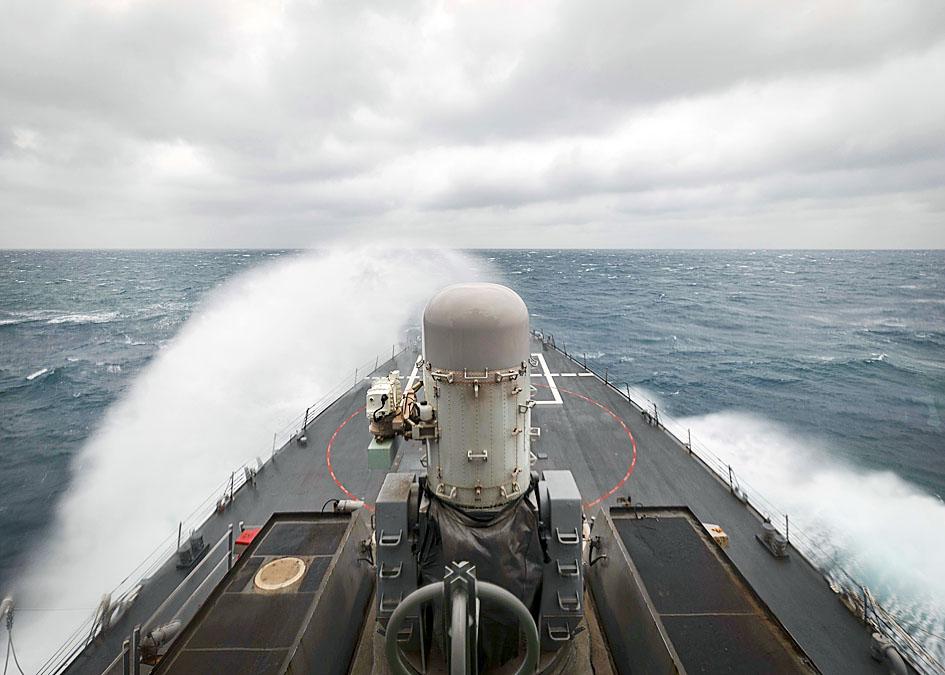The New York-based Council on Foreign Relations (CFR) on Thursday listed a possible conflict between the US and China over Taiwan as a top-tier concern for the first time in its annual Preventive Priorities Survey.
The report assessed the likelihood and effects of 30 potential conflicts that could break out over the next year based on responses from 550 US government officials, foreign policy experts and academics.
Those conflicts are classified into one of three tiers, and the possibility of “intensifying political and economic pressure from China against Taiwan, leading to a severe crisis with the United States,” was classified as a “Tier 1” risk for the first time.

Photo: AP
A US-China conflict over Taiwan was listed as a “Tier 2” risk in 2019 and last year, but was moved up based on its potentially “high impact” on US interests and the moderate likelihood of it occurring, the report said.
A high impact on US interests refers to a contingency that directly threatens the US, a defense treaty ally or a vital strategic interest, and is thus likely to trigger a major US military response, based on the council’s definitions.
A “moderate” likelihood means that there is some chance of an event happening.
By contrast, the possibility of “an armed confrontation in the South China Sea involving China and the United States over freedom of navigation and disputed territorial claims” was downgraded from a Tier 1 to a Tier 2 risk, as it was judged to have a low likelihood of occurring in the coming year.
In addition to a crisis over Taiwan, the council also ranked as Tier 1 contingencies the heightening of military tensions with North Korea over its nuclear program, and an armed confrontation between Iran and the US or one of its allies over Iran’s involvement in regional conflicts and support of militant proxy groups.
Other Tier 1 risks included political instability in Afghanistan, Syria and Venezuela, Russian interference or intimidation against a NATO member, and the possibility of a major cyberattack or terrorist attack on the US.
Paul Stares, director of the council’s Center for Preventive Action, said in the report that the survey is intended to calculate the likelihood of specific contingencies based on the presence of known risk factors.
This ensures that “precautionary measures can be directed toward those [risks] that appear most threatening to lessen the chance that they materialize and reduce the harmful impact if they do,” he said.
The survey only included contingencies in which the US military could plausibly be employed, and therefore excluded other global risks, such as climate change, economic or health-related events, and natural disasters.
It also excluded the risk of domestic unrest or conflict within the US.

MAKING WAVES: China’s maritime militia could become a nontraditional threat in war, clogging up shipping lanes to prevent US or Japanese intervention, a report said About 1,900 Chinese ships flying flags of convenience and fishing vessels that participated in China’s military exercises around Taiwan last month and in January have been listed for monitoring, Coast Guard Administration (CGA) Deputy Director-General Hsieh Ching-chin (謝慶欽) said yesterday. Following amendments to the Commercial Port Act (商港法) and the Law of Ships (船舶法) last month, the CGA can designate possible berthing areas or deny ports of call for vessels suspected of loitering around areas where undersea cables can be accessed, Oceans Affairs Council Minister Kuan Bi-ling (管碧玲) said. The list of suspected ships, originally 300, had risen to about 1,900 as

Japan’s strategic alliance with the US would collapse if Tokyo were to turn away from a conflict in Taiwan, Japanese Prime Minister Sanae Takaichi said yesterday, but distanced herself from previous comments that suggested a possible military response in such an event. Takaichi expressed her latest views on a nationally broadcast TV program late on Monday, where an opposition party leader criticized her for igniting tensions with China with the earlier remarks. Ties between Japan and China have sunk to the worst level in years after Takaichi said in November that a hypothetical Chinese attack on Taiwan could bring about a Japanese

MORE RESPONSIBILITY: Draftees would be expected to fight alongside professional soldiers, likely requiring the transformation of some training brigades into combat units The armed forces are to start incorporating new conscripts into combined arms brigades this year to enhance combat readiness, the Executive Yuan’s latest policy report said. The new policy would affect Taiwanese men entering the military for their compulsory service, which was extended to one year under reforms by then-president Tsai Ing-wen (蔡英文) in 2022. The conscripts would be trained to operate machine guns, uncrewed aerial vehicles, anti-tank guided missile launchers and Stinger air defense systems, the report said, adding that the basic training would be lengthened to eight weeks. After basic training, conscripts would be sorted into infantry battalions that would take

DEEP-STRIKE CAPABILITY: The scenario simulated a PLA drill that turned into an assault on Taiwan’s critical infrastructure, with the launchers providing fire support Taiwan yesterday conducted this year’s first military exercises at Longsiang Base in Taichung, demonstrating the newly acquired High Mobility Artillery Rocket System’s (HIMARS) ability to provide fire support and deep-strike capabilities. The scenario simulated an attack on Penghu County, with HIMARS trucks immediately rolling into designated launch areas and firing barrages at the Wangan (望安) and Cimei (七美) islands, simulating the provision of fire support against invading forces. The HIMARS are supposed to “fire and leave,” which would significantly increase personnel and equipment survivability, a military official said. The drill simulated an exercise launched by the Chinese People’s Liberation Army (PLA) Eastern